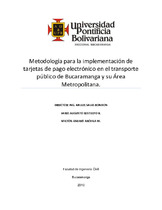| dc.contributor.advisor | Salas Rondón, Miller Humberto | |
| dc.contributor.author | Restrepo Badillo, Jairo Augusto | |
| dc.contributor.author | Archila Marquez, Milton Andres | |
| dc.coverage.spatial | Seccional Bucaramanga. Universidad Pontificia Bolivariana. Escuela de Ingenierías. Facultad de Ingeniería Civil | spa |
| dc.coverage.temporal | 2010 | |
| dc.date.accessioned | 2013-08-28T16:59:53Z | |
| dc.date.available | 2013-08-28T16:59:53Z | |
| dc.date.created | 2010-02-17 | |
| dc.date.issued | 2013-08-28 | |
| dc.identifier.uri | http://hdl.handle.net/20.500.11912/1022 | |
| dc.description | 38p.: (pdf); il; gráficas; anexos | spa |
| dc.description.abstract | La falta de ofertas tarifarias y el uso de dinero en efectivo a la hora de pagar por el uso del transporte público ha demostrado ser ineficiente y produce un efecto negativo para el usuario. Este documento presenta una propuesta para modificar el sistema tarifario de nuestro transporte público colectivo, con el fin de hacerlo más atractivo para los ciudadanos. La propuesta consta de dos partes importantes, las cuales son, suprimir el uso del dinero en efectivo en el momento de abordar el vehículo de servicio público mediante el uso de tarjetas inteligentes y ampliar la variedad de ofertas tarifarias de este mismo. Actualmente en nuestro medio, los conductores de bus no reciben un sueldo fijo mensual sino que reciben una comisión por cada pasajero que ingrese al vehículo. Esto genera lo que conocemos como la “guerra del centavo”, que hoy en día es uno de los factores que más deteriora la prestación de un buen servicio de transporte. Ya que el conductor no ve un pasajero, sino una comisión más que va a recibir. Conociendo ya los puntos claves a intervenir se propone un nuevo sistema tarifario y se replanteará el funcionamiento del transporte público desde el movimiento de los vehículos hasta la forma en que trabajan sus empleados, es decir, los conductores. Así dado este primer paso se experimentara un cambio cultural que traera muchos beneficios para la sociedad en el campo organizacional, ambiental y de convivencia. Este tipo de cambios necesitan aceptación y apoyo económico tanto de los usuarios como de los empresarios. Por medio de este documento se logró demostrar que los dos grupos están dispuestos a poner de su parte para lograr el objetivo propuesto y también se pudo exponer y captar la realidad que perciben las personas sobre los futuros beneficios de estas medidas. | spa |
| dc.description.abstract | The lack of pricing deals and use cash when paying for the use of public transport has proved to be inefficient and produces a negative effect for the user. This paper will present a proposal to amend the tariff of our public transport, to make it more attractive for citizens. The proposal contains two major parts, which are to suppress the use of cash when boarding the vehicle of public service through the use of smart cards and expand the variety of pricing deals. Actually in our area, bus drivers do not receive a fixed monthly salary but receive a commission for each passenger entering the vehicle. This creates what is known as the \"penny war\", which today is one of the factors that affect the providing of a good transport service. Because the driver does not see a passenger, but a commission he is going to receive. Knowing the key points to intervene, a new tariff system will be designed and will reconsider the operation of public transport from the movement of vehicles to the way they work their employees, meaning the drivers. So given this first step, a cultural shift will be experienced that will draw many benefits for society in the organizational, environmental and coexistence field. Such changes need acceptance and economic support from both users and entrepreneurs. Through this document, it was possible to demonstrate that the two groups are willing to do their part to achieve the intended objective and could expose and capture the reality that people perceive about the future benefits of these measures. | |
| dc.language.iso | es | |
| dc.publisher | Universidad Pontificia Bolivariana | spa |
| dc.rights | Attribution-NonCommercial-NoDerivatives 4.0 International | * |
| dc.rights.uri | http://creativecommons.org/licenses/by-nc-nd/4.0/ | * |
| dc.subject | Tesis y disertaciones académicas | spa |
| dc.subject | Ingeniería civil | spa |
| dc.subject | Transporte público - tarjeta electrónica | spa |
| dc.subject | Transporte público - Bucaramanga | spa |
| dc.subject | Política de transporte | spa |
| dc.title | Metodología para la implementación de tarjetas de pago electrónico en el transporte público de Bucaramanga y su área metropolitana | spa |
| dc.type | bacherlorThesis | spa |
| dc.rights.accessRights | openAccess | spa |
| dc.type.hasVersion | publishedVersion | spa |
| dc.identifier.instname | instname:Universidad Pontificia Bolivariana | spa |
| dc.identifier.reponame | reponame:Repositorio Institucional de la Universidad Pontificia Bolivariana | spa |
| dc.identifier.repourl | repourl:https://repository.unab.edu.co/ | |


